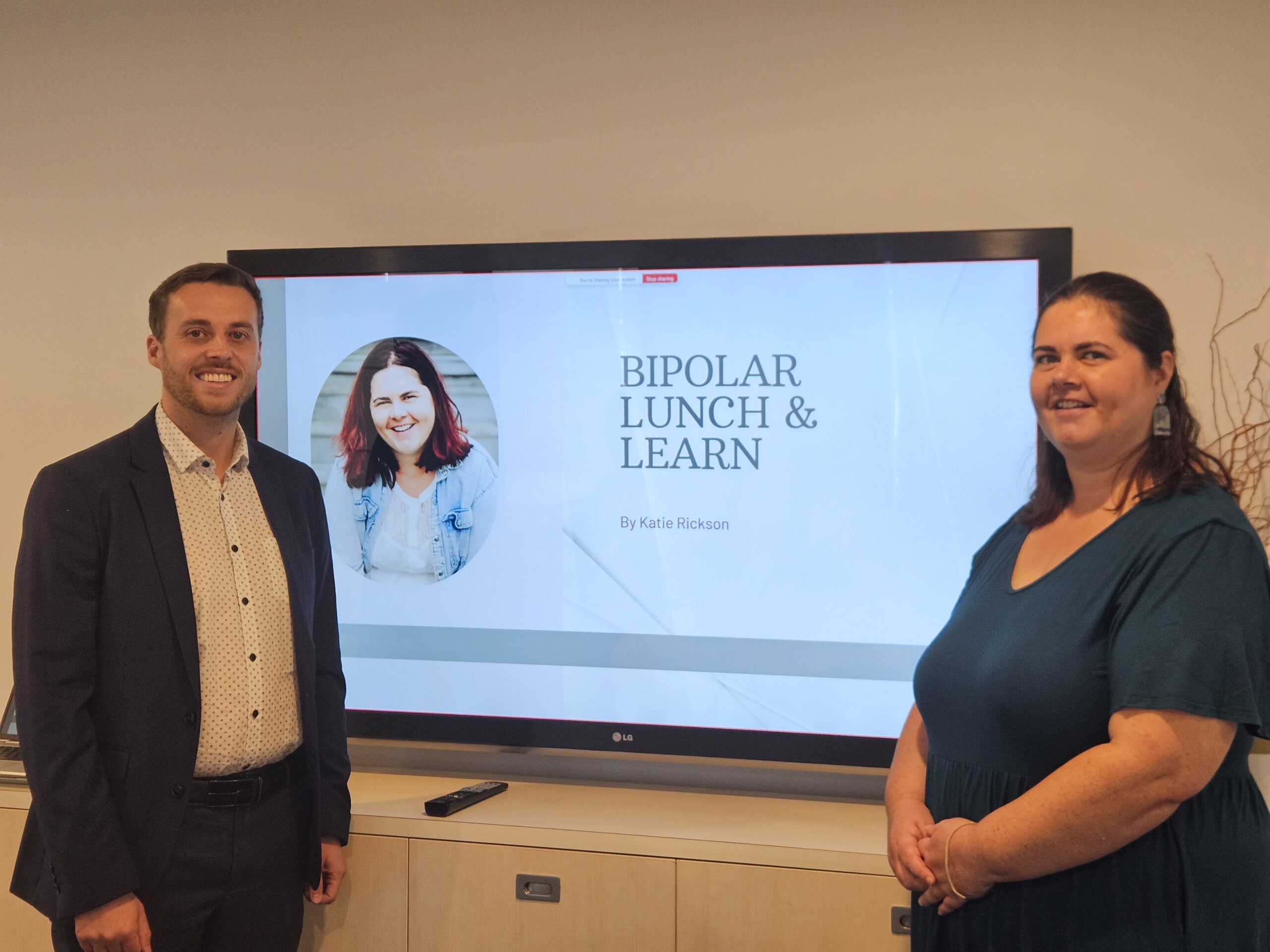Limited spaces available for Mental Health Awareness Week 2025. Register your interest today.
what client says
“The techniques on supporting people with bipolar were extremely helpful. Your personal experience made it real and so much more powerful. Keep it up, Katie… great cause!”
RSM New Zealand (Auckland North)
Why choose someone with lived experience?
Why choose Katie?
I’m Katie, a seasoned content writer, editor, storyteller, and public speaker with lived experience of bipolar. Since 2017, I’ve crafted hundreds of blogs, case studies, white papers, and annual
reports, and edited several books for self-published authors.
My story is one of resilience and self-compassion—navigating bipolar while building a fulfilling career.
From feedback I know my tales of life with bipolar resonate with business leaders, creative entrepreneurs, and neurodivergent people. I inspire workplaces to become more inclusive, informed and compassionate—sharing real insights to nurture and sustain mental health and well-being.
Podcast and live appearances
I’ve already shared my story here:

- MUV Talks (a panellist on neurodiversity)
- The OneUp Project
- Creative Mother
- Poetry Snaps
- Tough Mother
- She Owns It
- Yarns for the Soul

Lived experience can transform workplace conversations around mental health.
As organisations increasingly prioritise mental health awareness, many are discovering that authentic voices carry more weight than traditional corporate approaches.
Having personally navigated bipolar while building a career, I’ve seen first-hand how lived experience can transform workplace conversations around mental health.

Why Lived Experience Matters
When we talk about mental health in the workplace, there’s often a gap between intentions and practice.
As a lived experience speaker, I can bridge this gap, offering authentic insights that go beyond the textbook.
Here are the 5 reasons why you should consider investing a portion of your well-being budget in a lunch and learn session with me.
1. Responsibility:
Show your genuine commitment beyond tick-box exercises.
2. Represent:
Help shift negative narratives and stereotypes around conditions like bipolar to reduce stigma and promote inclusion.
3. Reinforce:
Reinforce your integrity and demonstrate your values, culture and commitment to authentic inclusion, staff well-being, and psychological safety.
4. Reinvigorate:
Discover fresh perspectives and practical strategies you and your team can apply immediately for better mental health at work and at home.
5. Reward:
Enhance your staff’s creativity, loyalty, and contribution through authentic inclusion (reduce absenteeism and the need to mask).
 The impact of booking Katie
The impact of booking Katie
The impact of embracing neurodiversity extends far beyond raising awareness. Organisations that genuinely include and value neurodivergent staff often experience a raft of benefits which expand their culture and boost their bottom line.
For instance, teams with diverse thinking styles are less prone to groupthink, leading to more innovative problem-solving and creative outputs.[1] There’s often increased loyalty among staff who feel truly seen and supported, which in turn boosts overall productivity.
Be the place where everyone wants to work. Don’t just pay lip service to mental health but actively create an environment where all minds are valued.
Enhance your reputation as a progressive, empathetic and compassionate business. In my experience, the most successful companies are those that view neurodiversity as a strength rather than a challenge to be tolerated, managed or worse, dismissed.
By tapping in to the unique perspectives and skills of neurodivergent individuals, it’s a win-win situation: benefiting leaders, staff, and clients alike.
[1] The Neurodiversity Edge: The Essential Guide to Embracing Autism, ADHD, Dyslexia, and Other Neurological Differences for Any Organization by Maureen Dunne.
what client says
“Everyone was very touched by your courage in making the effort to share your story. People said they found it very useful and insightful. It was very striking – your pathway to increasing other’s awareness.”
– Music Therapy Programme at Te Herenga Waka—Victoria University of Wellington where I’ve guest lectured every year since 2018.
Why learn about bipolar?
Learning about bipolar could save or change lives.
1) The sad reality of misdiagnosed bipolar—not getting the right care.
“Studies have shown what I believe to be a problem for so many bipolar patients and their families: From the first time a bipolar-type mood event occurs to the first time bipolar disorder is specifically treated, a typical patient will have gone an average of nearly ten years without proper care.”
2) People living with bipolar are at much greater risk of suicide.
“Suicide is prevalent in bipolar disorder. Suicide potential is at least twenty times higher among people with bipolar compared to everyone else.”
3) It is more common than you may think
– you’re likely to know at least one person living with bipolar.
“Up to 2% of the adult population are diagnosed with bipolar at some time in their lives and around 5% of people may experience milder, but noticeable mood fluctuations.”
4) The stress of our modern lives, world events and personal challenges.
“When it comes to bipolar disorder and other mental illnesses, stress is a huge trigger. Reducing the amount of stress in your life will greatly reduce the intensity and frequency of your episodes.
There is good stress and bad stress. Our bodies do not make a distinction between the two.
Stress is stress. It does not matter whether it is good or bad.”
1 & 2 From: Owning Bipolar – How Patients and Families Can Take Control of Bipolar Disorder by Michael G Pipich.
Why choose someone with lived experience?
I help leaders understand bipolar and neurodivergence, so they can create more inclusive and healthier workplaces where everyone is given the opportunity to contribute meaningfully.
In just 90 minutes you and your team will learn:
In just 90 minutes, you and your team will learn:
- Simple shifts leaders can make to create neuro-inclusive teams.
- What living and working with bipolar can teach us about compassion, creativity and resilience.
- What bipolar, mania and depression can look and feel like.
- Helpful things to say and ask – and what to avoid.
- Self-care, self-compassion and sensory regulation techniques.
- How to support each other at work.
- Ways to reframe bipolar – including neurodiversity and a strengths-based lens.
- The important role of therapy and various therapeutic options.
- What else can the “A” stand for in MHAW? Moving from awareness to action and accommodations at work.
- Important numbers and resources for further reading.

What my clients say.
“You were very honest, raw and you inspired me. I wouldn’t normally be so open with someone I just met but your presentation gave me that ability to feel safe. When you shared your stories, I finally understood what my family member went through. Thank you for giving me the ability to see them in a different way.”
– Tax Traders.
ready to be captivated
Ready to be captivated, challenged, inspired and more informed?
In just 90 minutes you and your team will learn:
Pricing starts from $1,000 plus GST.
I offer a tiered pricing structure to give you the option to include a comprehensive workbook and confidential follow-up calls.
